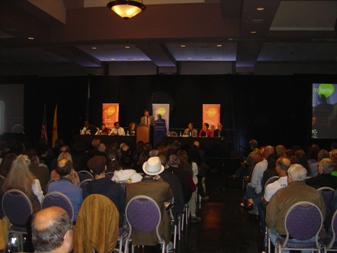Latest
Latin America: Former Mexican Foreigner Minister Accuses Army of Extra-Judicial Executions in Drug War
Townhall Meeting to Support Clarence Aaron
Marijuana Policy Projectâs 15th Anniversary Gala to Celebrate â15 States in 15 Yearsâ

FOR IMMEDIATE RELEASEÂ Â Â Â Â Â Â Â Â Â Â Â Â Â Â Â Â Â Â Â Â Â Â Â Â Â Â Â Â Â Â Â Â Â Â Â Â Â Â Â Â Â Â Â Â Â Â Â Â Â Â Â Â Â Â Â Â Â Â Â Â Â Â Â Â Â Â Â Â Â Â Â Â Â Â Â Â Â Â Â Â Â Â Â Â Â Â Â Â Â Â Â Â Â Â Â Â Â Â Â Â Â Â Â Â Â Â Â Â Â Â Â Â Â Â Â Â Â Â Â Â Â Â Â Â Â Â Â Â Â Â
NOVEMBER 19, 2009
Marijuana Policy Projectâs 15th Anniversary Gala to Celebrate â15 States in 15 Yearsâ
Celebrity guests and other prominent figures will help celebrate MPPâs remarkable passage of improved marijuana laws in 15 states in 15 years
CONTACT: Mike Meno, MPP assistant director of communications â¦â¦ 202-905-2030 or [email protected]
WASHINGTON, D.C. â The Marijuana Policy Project, Americaâs largest marijuana policy reform organization, will look back on 15 productive years of improving marijuana laws at a January 13 gala that will feature guest speakers such as talk show host Montel Williams. The star-studded host committee includes Melissa Etheridge, Tom Robbins, Bill Maher, Ben Taylor, Steve Buscemi, Susan Sarandon, Lewis Black, Nicole Atkins, Margaret Cho, Mark Leno, Hal Sparks, Ani DiFranco, Garry Trudeau, and Medeski, Martin and Wood, along with many other prominent supporters. Â Â Â Â
        When MPP was founded in 1995, medical marijuana was illegal in all 50 states. Since then, 13 states have passed medical marijuana laws, with Michigan becoming the 13th state in November 2008, when Michigan voters passed MPP's ballot initiative by a 63% to 37% margin. By the end of 2010, MPP is hopeful that medical marijuana will be legal in 15 states (with passage in New York and New Jersey).
        At the same time, marijuana possession is now decriminalized in 13 states, with Massachusetts becoming the 13th state in November 2008, when Massachusetts voters passed MPP's ballot initiative by a 65% to 35% margin. In 2010, MPP is hopeful that marijuana will be decriminalized in 15 states (with Rhode Island and Vermont becoming the 14th and 15th states).
        WHAT: The Marijuana Policy Projectâs 15th Anniversary Celebration
        WHEN: January 13, 2010. Press Availability from 6:00 to 6:30 p.m.
                       Reception from 6:30 â 7:30 p.m. Dinner from 7:30 to 11:00 p.m.
        WHERE: Hyatt Regency Washington on Capitol Hill, 400 New Jersey Avenue, NW, 20001
        Tickets cost $250 each, or $2,000 for a table.
        With more than 29,000 members and 100,000 e-mail subscribers nationwide, the Marijuana Policy Project is the largest marijuana policy reform organization in the United States. MPP believes that the best way to minimize the harm associated with marijuana is to regulate marijuana in a manner similar to alcohol. For more information, please visit http://MarijuanaPolicy.org.
####
Drug Czar's Website Still Wrong About AMA's Medical Marijuana Stance
Major public health organizations do not support smoking marijuana as medicine.
The National Multiple Sclerosis Society, the American Medical Association and the American Academy of Ophthalmology all oppose the smoked form of marijuana as medicine...
So, if the drug czar thinks "every American should know" about AMA's position on medical marijuana, will he now inform Americans that the position has changed? Somehow I doubt it, but at the very least, this now-false claim that AMA opposes medical marijuana should be removed immediately.
Let me be clear about this too, because I donât want anyone thinking this is just some smug campaign to rub AMA's new position in the face of drug warriors all over the web. This document, "What Every American Should Know About Medical Marijuana," is a dreadful Bush-era hatefest that positively drips with outrageous & out-of-context propaganda points and should have been tossed from the site back in January, along with all the other rancid garbage John Walters left in the fridge at ONDCP.
This document even contains the unbelievable Steve Kubby smear, in which Kubby's statements about Marinol saving his life in prison were spun as opposition to medical marijuana (I highly recommend revisiting that one if you donât remember it, because it's so much worse than I can even describe in one sentence). And this isn't some dusty artifact I dug up from the cavernous bowels of ONDCP.gov either, it is currently the #1 search result for "medical marijuana" on the drug czar's website.*Â
So please join me in sending the drug czar a note asking that this outdated and offensive document be removed from his site once and for all. Whether it's because the reference to AMA is no longer accurate, or because the rest of the thing in its entirety is just a raging trainwreck of distortion and nastiness, or because the new administration has pledged to respect state medical marijuana laws instead of vilifying doctors and patients, this type of rhetoric has no place in the drug policy debate.
Please contact the drug czar today to ask that the document "What Every American Should Know About Medical Marijuana" be permanently removed from ONDCP.gov. Thanks.
*Update: Interestingly, the document is now much more difficult to find on the ONDCP website. Last night, it came up #1 in a search for "medical marijuana." Now I can only locate it by using more specific search terms. Hopefully, this signals that it's in the process of being removed, although the PDF is currently still being hosted by ONDCP.
Update 2: Our friends at LEAP have created an action alert where you can send a pre-written message to DEA & ONDCP requesting the necessary corrections.
DEA Website STILL Wrong About AMA's Medical Marijuana Stance
Rarely, if ever, has the DEA responded so quickly and cooperatively when activists complained about the accuracy of government anti-drug propaganda. But, the job isn't done just yet. It seems the clever folks at DEA took our complaints literally, and only fixed the page we mentioned, rather than making all the necessary corrections.
DEA's youth website, JustThinkTwice.com, still contains two separate inaccurate statements about AMA's position on medical marijuana:
http://www.justthinktwice.com/factfiction/MarijuanaisMedicine.cfm"The American Medical Association has rejected pleas to endorse marijuana as medicine, and instead has urged that marijuana remain a prohibited, Schedule I drug, at least until more research is done."
http://www.justthinktwice.com/stumbleweed/rx_pot_01.htm
"The American Medical Association rejected marijuana as medicine."
Of course, it's quite likely that similar claims can still be found elsewhere on DEA websites and it's their responsibility to clean up the mess. Hopefully, DEA is more familiar with its own web content than we are, so it shouldnât be too hard to go through there and set everything straight.
Let's all do our part to help DEA with the editing process by copying the links above and clicking here (then scroll down) to send them a reminder that more corrections are needed. When it comes to providing the public with accurate and up-to-date information about drugs, the DEA is in desperate need of our asistance, so please take a few moments to lend them a hand.
Update: Our friends at LEAP have created an action alert where you can send a pre-written message to DEA & ONDCP requesting the necessary corrections.
Press Release: California Budget Deficit Balloons, While Prisons on Schedule to Overspend by $1.4 Billion
Press Release: NJ Senate Comm. to Vote on Reforming Mandatory Minimum Drug Laws
Nice People Take Drugs
 Last but not least, for now, a picture I snapped during the conference's closing plenary, former New Mexico Governor Gary Johnson delivering the keynote:
Last but not least, for now, a picture I snapped during the conference's closing plenary, former New Mexico Governor Gary Johnson delivering the keynote:

Pagination
- First page
- Previous page
- …
- 512
- 513
- 514
- 515
- 516
- …
- Next page
- Last page